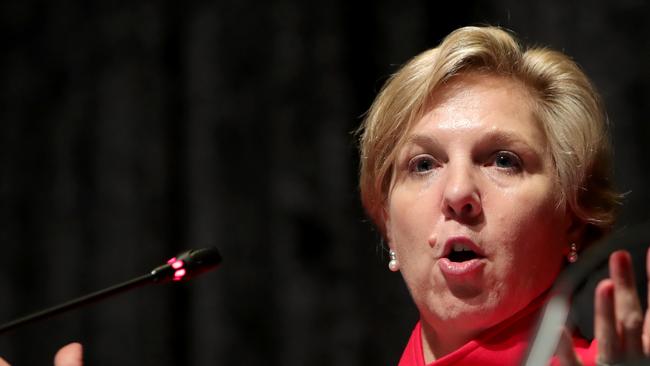Funding the future: tech family gets behind women
Women entrepreneurs are getting a much-needed boost from this family investment house.

Robyn Denholm is one of Australia’s leading tech executives as chair of Tesla and the Tech Council of Australia, and an operating partner at Blackbird. She’s built a high global profile in the sector as an advocate and venture capitalist and boasts a career at companies including Toyota, Sun Microsytems and Telstra. Now Denholm is putting her own money where her mouth is, emerging as one of the nation’s keenest financial backers of female-led tech businesses.
Her family office, the Wollemi Capital Group, has a focus on “science and technology investments that help the environment, property investments that can demonstrate leadership in those technologies, and businesses that help communities such as hospitality or sports”.
Among those backed by Wollemi, which is led by Denholm’s daughter Victoria, is Threadicated – an online personal styling service which uses stylists plus AI to select a five-piece parcel of clothing and accessories for clients.
Founder Danielle Johansen launched the operation in 2019 from her North Sydney apartment but now employs 15 people, dealing with about 200 clients each month, and drawing on about 50,000 products from more than 150 different brands and suppliers. Wollemi now holds a 3.29 per cent stake in the company.
The basic cost to clients of the service is $79, covering styling, free shipping returns if people decide not to buy items, and follow-up advice on how to wear the pieces to best effect. The turnaround time is about one week but Threadicated can speed that up if clients have a hot date.
Johansen says the business did well during Covid when clients wanted to look good – at least from the waist up – for Zoom calls. Men have more recently taken to the service and Johansen notes they “do love a navy cashmere sweater”.
She calls her company “HelloFresh for clothes” referencing the online meal delivery operation.
But who uses the styling service?
“It’s such an interesting mix of people,” says Johansen. “We’d have everyone from trainees to solicitors. We have grandmas, we have people who have just finished university. It is such an amazing diverse mix. It’s a lawyer one minute and then it’s a truck driver who’s got his brother’s wedding or something like that.
“It’s for a person who basically values their time and convenience and can see that an expert could possibly do it better. We go to a restaurant if we want a high-quality, amazing meal and it’s the same sort of thing with Threadicated if you want someone to take a professional look at your style and help you with that.”
Johansen is not a tech person and hired people to build the AI design to speed the selection process: “I was just doing it all by myself and we had more and more people signing up and I would take four or five hours to style each person.
“So basically the AI we built as a process to streamline everything, cut out all the noise, everything that doesn’t make sense for that client and present the obvious choices that are going to work for them.”
She has done two investment rounds, with Wollemi in the second round. Johansen says Threadicated has an 80 per cent sale rate with only one in five items returned.
Men favour those navy sweaters but women go for a “crisp white shirt”. And they are asking for more bright colours than in the past (“people don’t want to fade into the background anymore”) and opting for flat shoes rather than stilettos.
Says Johansen: “Women are just dying for flat shoes; we barely send a heel these days unless it is a very specific request. It’s flat shoes; everyone just loves them.”
Denholm’s Wollemi was established two years ago and has bought into the Sydney Kings and Sydney Flames basketball teams via a 30 per cent interest in Hoops Capital. Victoria Denholm is now president of the women’s team.
In the tech space, Wollemi has also invested in Ariella Heffernan-Marks of Ovum Technology; Jekaterina Viktorova from Syenta; Marisa Warren and Kate Vale from ALIAVIA Ventures; Helena Turpin from GoFIGR; Lara Solomon from Hoopsy; and Camille Goldstone-Henry and Jada Andersen from Xylo Systems.
The need to back women is clear enough: In 2022, the State of Australian Startup Funding report found only 3 per cent of total VC capital went to all-women-founded start-ups, with only 10 per cent going to those with at least one woman in their co-founding teams.
Victoria Denholm says: “People keep talking about a slow burn towards a more equitable ecosystem for women, but in our eyes that’s not good enough. Slow won’t cut it when it comes to women leaders, especially when there are critical opportunities available right now.”
She says funding for female-led tech start-ups has decreased over the past 12 to 18 months as a percentage of investment.
“For us it’s about finding opportunities, that are overlooked by the current market but also that we’re passionate about,” she says. “We’re in a unique and beautiful position, having a breadwinner of our family who is female to really advocate and look for those opportunities and diverse founders and provide capital for what we think are really good businesses.”
She notes that her mother Robyn has been involved in early stage investing as an operating partner at Blackbird: “Getting in early and helping these companies is important. I think it’s also been missing from the Australian ecosystem for a long time. The reason a lot of established companies (in the US) get there is that they find backers early. Australia, while we’re doing a lot better of a job now than we were, say, five or 10 years ago, we still have a long way to go to catch up to the likes of the US and the UK.”
Wollemi has also invested in several male-led companies and Denholm says “at the end of the day, we’re looking to invest in good companies (but) we think that diverse founders are being overlooked, so there’s real market opportunity as well as an impact focus”.
What does she look for in start-ups?
“For us the founder is really important. In early stage tech, you’re investing in the founder and their idea as much as you’re investing in anything else,” she says.
“It’s really finding people who have found a problem that they’re solving for, or have real focus and expertise in the space they’re playing in. (And) we have the luxury of being able to invest in things that we are interested in and find exciting, and so that sways our thinking as well.”
Denholm says investing is as much about “us being the right investor for the company, as it is the founder and the company being the right investment for us”.
The company, based in Sydney, is small, with Denholm and her brother Matthew working with her mother and other external advisers and an investment committee. Robyn Denholm is “very involved” but her daughter says she has given the siblings a lot of autonomy.
Victoria, who is CEO of Wollemi , has a masters in commerce and has a background in helping founders via the KPMG high-growth ventures operation, and through government programs at state and federal level.
“I love working with founders and hearing their energy about the problem they’re solving,” she says.
“I think it’s been a really nice fit both being able to source deals from my existing networks (and) obviously a lot comes through Mum’s channels as well.
“We’ve started to build a bit of a reputation, especially in the diverse founders and female ecosystem. I think the family office network is also incredibly collaborative and (we) get a number of deals through those channels as well. There’s definitely no shortage of deal flow in Australia at the moment. I think for us it’s just finding the right ones that make sense.”
She says one challenge for female entrepreneurs is accessing and building the networks needed to source capital. And sometimes it’s about the way women pitch.
“Women tend to be more humble and realistic in their expectations around growth and numbers,” Denholm says.
“I think that’s the challenge – the language, and finding those investors who are willing to work with them on a journey that looks slightly different.”




To join the conversation, please log in. Don't have an account? Register
Join the conversation, you are commenting as Logout